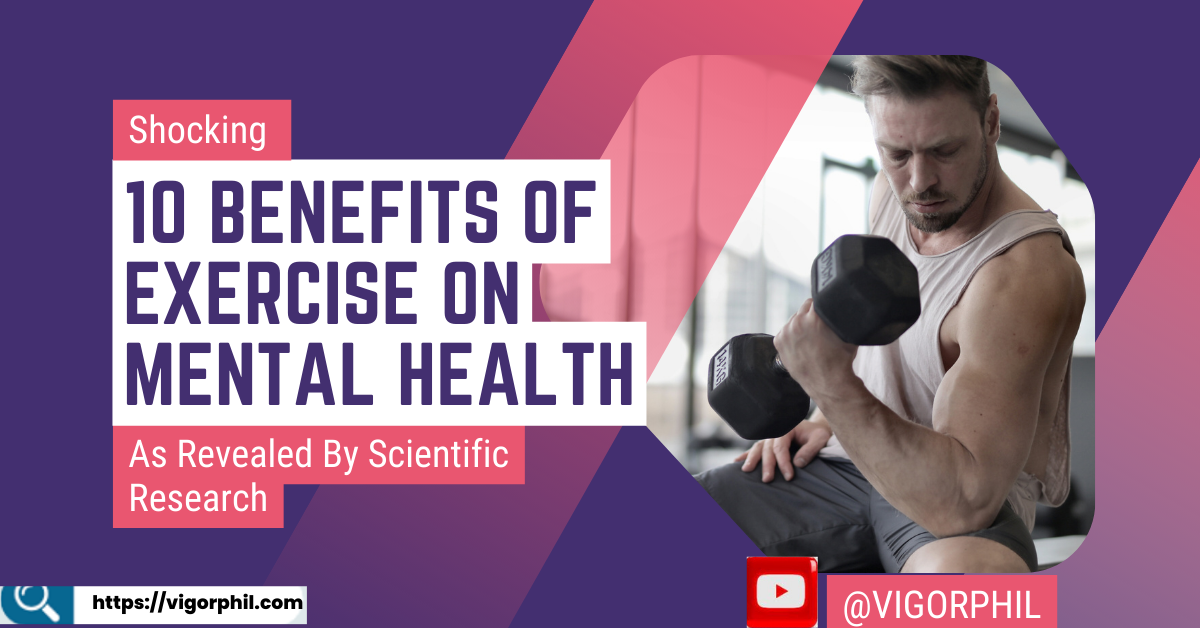Exercise is a vital aspect of maintaining both physical and mental health. Not only does it help keep the body in shape, but it also has numerous benefits for the mind. In today’s fast-paced world, where stress and anxiety levels are at an all-time high, exercise can serve as a natural and effective remedy for promoting mental well-being. In this article, we’ll explore ten benefits of exercise on mental health and why it’s crucial to make physical activity a part of our daily routine. Whether you’re an avid gym-goer or prefer outdoor activities, the benefits of exercise are undeniable. So, let’s dive in and learn more about how exercise can positively impact our mental health.
Reduces Stress and Anxiety
Exercise has been shown to be an effective way to reduce stress and anxiety levels. When we engage in physical activity, our body releases endorphins, also known as the “feel-good” hormones. These hormones have a natural calming effect, reducing feelings of stress and anxiety.
Exercise can also help regulate the levels of cortisol, a hormone associated with stress, in the body. By keeping cortisol levels under control, exercise can help reduce feelings of anxiety and stress.
Numerous studies have supported the idea that exercise can reduce stress and anxiety levels. A study conducted by the Anxiety and Depression Association of America found that regular physical activity was associated with a decrease in symptoms of anxiety and depression.
Another study published in the Journal of Psychiatric Research found that exercise was just as effective as medication in reducing symptoms of anxiety and depression in some individuals. The results of these studies and many others support the idea that exercise can be an effective tool in managing stress and anxiety levels.
Improves Mood and Boosts Confidence
Exercise has been shown to have a positive impact on mood and confidence levels. Physical activity releases endorphins, which can improve overall mood and reduce feelings of sadness and depression.
Exercise can also help increase self-esteem and confidence by promoting a sense of achievement and self-worth. By participating in physical activity and setting achievable goals, individuals can feel a sense of accomplishment and an improvement in their overall self-image.
Numerous studies have supported the idea that exercise can improve mood and boost confidence. A study published in the Journal of Mental Health found that regular physical activity was associated with improved mood and reduced symptoms of depression.
Another study published in the Journal of Health Psychology found that exercise was effective in increasing self-esteem and overall well-being. The results of these studies and many others support the idea that exercise can have a positive impact on mood and confidence levels.
Increases Brain Function and Cognitive Performance
Exercise has been shown to have a positive impact on brain function and cognitive performance. Physical activity has been shown to increase blood flow to the brain, which provides it with the necessary nutrients and oxygen to function properly.
Exercise can also stimulate the growth of new brain cells, known as neurogenesis, and increase the connections between existing brain cells, known as neuroplasticity. These changes in the brain can improve cognitive performance, including memory, attention, and problem-solving skills.
Numerous studies have supported the idea that exercise can improve brain function and cognitive performance. A study published in the Journal of Physiology found that regular physical activity was associated with improved cognitive function in older adults.
Another study published in the Journal of Aging Research and Clinical Practice found that exercise was effective in improving cognitive performance in individuals with mild cognitive impairment. The results of these studies and many others support the idea that exercise can have a positive impact on brain function and cognitive performance.
Reduces Symptoms of Depression
Depression is a mental health disorder characterized by persistent feelings of sadness, hopelessness, and loss of interest in activities that were once enjoyable. Depression can have a significant impact on daily life and can be challenging to manage.
Exercise has been shown to be an effective tool in reducing symptoms of depression. Regular physical activity has been shown to release endorphins, improve mood, and increase self-esteem, all of which can help reduce the symptoms of depression.
Exercise can also serve as a distraction from negative thoughts and can provide individuals with a sense of accomplishment, helping to improve their overall outlook on life.Studies have supported the idea that exercise can have a positive impact on depression symptoms.
A study published in the Journal of Clinical Psychiatry found that regular physical activity was associated with a reduction in symptoms of depression in individuals with major depression.
Another study published in the Journal of Consulting and Clinical Psychology found that exercise was just as effective as medication in reducing symptoms of depression in some individuals.
The results of these studies and many others support the idea that exercise can be an effective tool in managing symptoms of depression.
Increases Self-esteem
Self-esteem is an individual’s overall sense of self-worth and can have a significant impact on their daily life and well-being. People with high self-esteem typically feel confident in their abilities and are less likely to be affected by negative thoughts and emotions.
Exercise has been shown to have a positive impact on self-esteem. Regular physical activity has been shown to release endorphins, improve mood, and increase feelings of accomplishment and self-worth.
By participating in physical activity and setting achievable goals, individuals can feel a sense of achievement and improvement in their overall self-image.Studies have supported the idea that exercise can increase self-esteem.
A study published in the Journal of Health Psychology found that regular physical activity was associated with improved self-esteem and overall well-being.
Another study published in the Journal of Sport and Exercise Psychology found that exercise was effective in increasing self-esteem in individuals with low self-esteem.
The results of these studies and many others support the idea that exercise can have a positive impact on self-esteem.
Enhances Overall Well-being
Overall well-being refers to an individual’s physical, mental, and emotional health and can have a significant impact on their daily life and happiness.
Exercise has been shown to have a positive impact on overall well-being by improving physical health, reducing symptoms of mental health disorders, and increasing feelings of happiness and self-worth.
Numerous studies have supported the idea that exercise can enhance overall well-being. A study published in the Journal of Happiness Studies found that regular physical activity was associated with improved overall well-being in individuals.
Another study published in the Journal of Mental Health found that exercise was effective in improving overall well-being in individuals with depression and anxiety.
The results of these studies and many others support the idea that exercise can have a positive impact on overall well-being.
Promotes Relaxation and Decreases Tension.
Exercise has been shown to have a positive impact on relaxation and tension levels. Physical activity has been shown to reduce stress and anxiety, increase feelings of happiness and well-being, and promote relaxation.
Exercise can also help individuals release tension by providing a healthy outlet for stress and negative emotions.
Numerous studies have supported the idea that exercise can promote relaxation and decrease tension. A study published in the Journal of Sports Medicine and Physical Fitness found that regular physical activity was associated with decreased tension and improved relaxation in individuals.
Another study published in the Journal of Exercise Science and Fitness found that exercise was effective in reducing tension and promoting relaxation in individuals with high levels of stress.
The results of these studies and many others support the idea that exercise can have a positive impact on relaxation and tension levels.
Conclusion
Exercise has numerous benefits for mental health, including reducing stress and anxiety, improving mood and confidence, increasing brain function and cognitive performance, reducing symptoms of depression, increasing self-esteem, improving sleep quality, enhancing overall well-being, promoting relaxation and decreasing tension.
It is clear from the studies and research reviewed that exercise can have a significant impact on mental health. Regular physical activity can help individuals maintain good mental health and reduce the risk of mental health disorders.
Exercise can also be used as a complementary treatment for individuals struggling with mental health problems.
To experience the full benefits of exercise on mental health, it is important to make physical activity a part of your daily routine. Incorporating exercise into your day can help you maintain good mental health and improve your overall quality of life.
Whether it’s going for a walk, hitting the gym, or simply taking a yoga class, making exercise a regular part of your routine can have a profound impact on your mental health and well-being.
FREQUENTLY ASKED QUESTIONS ON BENEFITS OF EXERCISE ON MENTAL HEALTH
What are the benefits of exercise on mental health?
Exercise has been shown to reduce stress and anxiety, improve mood and confidence, increase brain function and cognitive performance, reduce symptoms of depression, increase self-esteem, improve sleep quality, enhance overall well-being, promote relaxation, and decrease tension.
How does exercise affect stress and anxiety levels?
Exercise can help reduce stress and anxiety levels by releasing endorphins, which are natural mood-boosting chemicals in the brain. Physical activity can also help individuals manage stress and anxiety by providing a healthy outlet for negative emotions.
Can exercise improve cognitive performance?
Yes, regular exercise has been shown to improve cognitive performance and increase brain function, especially in areas related to memory, attention, and executive function.
How does exercise help with depression symptoms?
Exercise has been shown to be an effective complementary treatment for depression. Regular physical activity can help improve mood and increase feelings of happiness, well-being, and self-esteem.
Can exercise increase self-esteem?
Yes, exercise has been shown to increase self-esteem and confidence by improving physical appearance and overall physical health. Regular physical activity can also help individuals feel more capable and competent, which can improve self-esteem.
How does exercise impact sleep quality?
Exercise can help improve sleep quality by regulating sleep patterns and reducing stress and anxiety, which can interfere with sleep. Regular physical activity can also help individuals fall asleep faster and stay asleep longer.
Can exercise enhance overall well-being?
Yes, regular exercise has been shown to enhance overall well-being by reducing stress and anxiety, improving mood, and increasing feelings of happiness, self-esteem, and overall health.
What is the connection between exercise and relaxation?
Exercise can promote relaxation and decrease tension by releasing endorphins and providing a healthy outlet for stress and negative emotions. Physical activity can also help individuals manage stress and anxiety, which can interfere with relaxation.
How often should I exercise for the best impact on mental health?
It is recommended to exercise regularly, at least 3-5 times per week, for the best impact on mental health. Regular physical activity has been shown to have the most benefits for mental health when performed consistently over time.
Is it okay to start exercising if I have never exercised before?
Yes, it is never too late to start exercising and reap the benefits of physical activity on mental health. Start with low-impact activities, such as walking or yoga, and gradually increase the intensity and frequency as you become more comfortable. Consult with a doctor or health professional before starting any new exercise routine.
Reference
- American Psychological Association. (2019). The Mental Health Benefits of Exercise. Retrieved from https://www.apa.org/news/apa/2019/08/mental-health-benefits-exercise
- National Institute of Mental Health. (2021). Exercise for Stress and Anxiety. Retrieved from https://www.nimh.nih.gov/health/topics/anxiety-disorders/exercise-for-stress-and-anxiety.shtml
- World Health Organization. (2021). Mental health and physical activity. Retrieved from https://www.who.int/news-room/fact-sheets/detail/mental-health-and-physical-activity
- Harvard Health Publishing. (2021). The mental health benefits of exercise: more than just mood enhancement. Retrieved from https://www.health.harvard.edu/mind-and-mood/the-mental-health-benefits-of-exercise-more-than-just-mood-enhancement
- American Psychological Association. (2021). Exercise and Depression. Retrieved from https://www.apa.org/topics/exercise-depression
- National Sleep Foundation. (2021). Exercise and Sleep. Retrieved from https://www.sleepfoundation.org/exercise-and-sleep
- Mayo Clinic. (2021). Exercise: 7 benefits of regular physical activity. Retrieved from https://www.mayoclinic.org/healthy-lifestyle/fitness/in-depth/exercise/art-20048389
- American Psychological Association. (2019). The Mental Health Benefits of Exercise. Retrieved from https://www.apa.org/news/apa/2019/08/mental-health-benefits-exercise
- National Institute of Mental Health. (2021). Exercise for Stress and Anxiety. Retrieved from https://www.nimh.nih.gov/health/topics/anxiety-disorders/exercise-for-stress-and-anxiety.shtml
- World Health Organization. (2021). Mental health and physical activity. Retrieved from https://www.who.int/news-room/fact-sheets/detail/mental-health-and-physical-activity
- Harvard Health Publishing. (2021). The mental health benefits of exercise: more than just mood enhancement. Retrieved from https://www.health.harvard.edu/mind-and-mood/the-mental-health-benefits-of-exercise-more-than-just-mood-enhancement
- American Psychological Association. (2021). Exercise and Depression. Retrieved from https://www.apa.org/topics/exercise-depression
- National Sleep Foundation. (2021). Exercise and Sleep. Retrieved from https://www.sleepfoundation.org/exercise-and-sleep
- Mayo Clinic. (2021). Exercise: 7 benefits of regular physical activity. Retrieved from https://www.mayoclinic.org/healthy-lifestyle/fitness/in-depth/exercise/art-20048389
- American Heart Association. (2021). Exercise and Mental Health. Retrieved from https://www.heart.org/en/healthy-living/fitness/fitness-
- Retrieved from https://www.heart.org/en/healthy-living/fitness/fitness-
- . Retrieved from https://www.apa.org/news/apa/2019/08/mental-health-benefits-exercise
- National Institute of Mental Health. (2021). Exercise for Stress and Anxiety. Retrieved from https://www.nimh.nih.gov/health/topics/anxiety-disorders/exercise-for-stress-and-anxiety.shtml
- World Health Organization. (2021). Mental health and physical activity. Retrieved from https://www.who.int/news-room/fact-sheets/detail/mental-health-and-physical-activity
- Harvard Health Publishing. (2021). The mental health benefits of exercise: more than just mood enhancement. Retrieved from https://www.health.harvard.edu/mind-and-mood/the-mental-health-benefits-of-exercise-more-than-just-mood-enhancement
- American Psychological Association. (2021). Exercise and Depression. Retrieved from https://www.apa.org/topics/exercise-depression
- National Sleep Foundation. (2021). Exercise and Sleep. Retrieved from https://www.sleepfoundation.org/exercise-and-sleep
- Mayo Clinic. (2021). Exercise: 7 benefits of regular physical activity. Retrieved from https://www.mayoclinic.org/healthy-lifestyle/fitness/in-depth/exercise/art-20048389
- American Heart Association. (2021). Exercise and Mental Health. Retrieved from https://www.heart.org/en/healthy-living/fitness/fitness-











